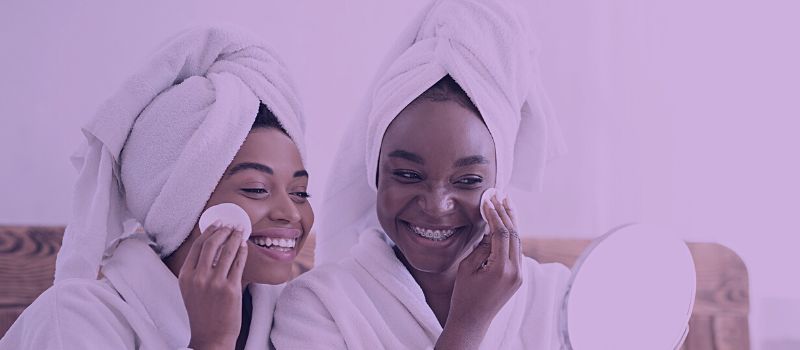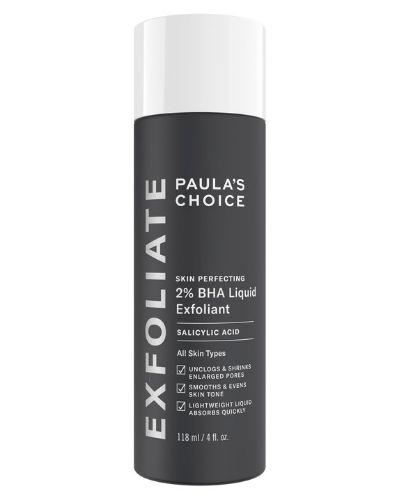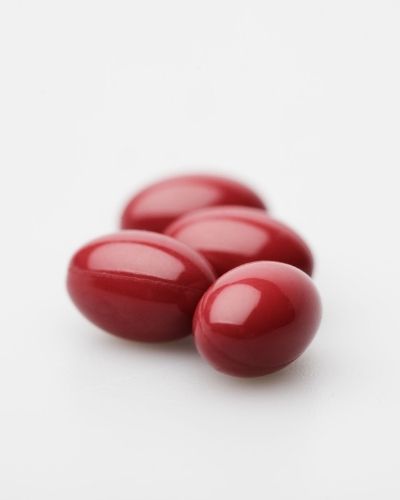
Can You Use Paula’s Choice BHA Liquid Exfoliant While on Accutane?
Table of Contents
There are many skincare products that can be used alongside Accutane to help hydrate the skin and relieve some of the drying effects this medication can have.
However, if there is one type of product that should never be introduced to the skin while on Accutane, it has to be the one we will talk about today.
So, to answer your question:
No, you can’t use Paula’s Choice BHA Exfoliant while on Accutane unless you want to deal with some pretty serious consequences.
But if you want to read more about how these two work and understand why you can’t combine them, continue reading.

NB: What if I told you I can show you how to never have acne again? If you have acne and want it gone, read this message.
How Does Paula’s Choice BHA Work?

Paula’s Choice: 2% BHA Liquid Exfoliant – $32
Paula’s Choice 2% BHA Liquid Exfoliant is a gentle, hydrating toner that helps unclog pores, smoothen skin texture, and improve skin’s radiance.
It contains 2% salicylic acid, which is an oil-soluble exfoliating ingredient that penetrates deep into the pores to dissolve pore-clogging debris made up of hardened oil, dead skin cells, and white blood cells.
As a result, this exfoliating toner can help reduce the appearance of blackheads, whiteheads, and more severe acne breakouts, which are skin issues directly caused by clogged pores.
In addition to the main active ingredient, the 2% BHA Liquid Exfoliant also contains soothing and nourishing ingredients, including moisturizing and skin-softening propanediol, anti-inflammatory green tea, and butylene glycol, a hydrating agent that helps the skin retain moisture.
Some benefits of using the Paula’s Choice 2% BHA Liquid Exfoliant include:
- Softer and smoother skin.
- Reduced appearance of blackheads, whiteheads, and acne.
- Healthy, glowy, and radiant complexion.
However, while the Paula’s Choice 2% BHA Liquid Exfoliant can offer benefits for the skin, it is also known for its initial side effects that some people might experience when first starting the product. Some of these include:
- Purging.
- Mild peeling and shedding (usually a sign of a compromised skin barrier.)
- Increased sun sensitivity.
- Mild to moderate stinging (again, usually a sign of a compromised skin barrier.)
Despite these potential side effects, the Paula’s Choice 2% BHA Liquid Exfoliant is generally considered safe for most skin types, including sensitive skin.
However, there is one group of people that shouldn’t use this product, and that’s those who are currently taking Accutane.
What is Accutane and What Does It Do?

Accutane is a medication known as isotretinoin that’s used to treat severe acne on the face and body.
It is also commonly prescribed to people whose acne has resisted previous treatments, such as benzoyl peroxide, adapalene, and antibiotics, as well as those dealing with severe acne in larger areas such as the chest and back.
Accutane works by inhibiting the function of the oil-producing glands by reducing the gland’s size. Once the gland’s size is reduced, the gland will then produce less oil.
This can help acne since excess oil is essentially food for the acne-causing bacteria that live on the skin; therefore, lack of it will cause the bacteria to become starved, thus minimizing proliferation and eventually minimizing acne.
However, if you are currently taking Accutane or have at least Googled this medication, you probably know that it comes with quite a list of potential side effects.
The most common side effects of taking Accutane include:
Other, more intense but less common side effects of taking Accutane include:
- Nose bleeds due to severely dry and chapped skin.
- Joint pain.
- Stomach ache.
- Hair loss.
- Blurry vision.
- Severe mood swings.
And although these definitely seem scary, it’s also important to note that most people don’t experience any intense side effects besides dry skin that’s more sensitive to the sun while taking Accutane.
However, it’s important to be aware of the potential risks associated with the medication before you start taking it.
If you experience any of these side effects, make sure to talk to your doctor right away.
Risks of Using Paula’s Choice BHA with Accutane
The main risk of using Paula’s Choice BHA or any product that contains exfoliating acids while on Accutane is the high possibility of compromising the skin barrier, which then brings on a plethora of other issues and discomforts such as irritation, burning, peeling, and increased sun sensitivity.
As I already mentioned earlier, Accutane is a powerful medication that inhibits the function of oil-producing glands and increases cellular turnover.
On the other hand, salicylic acid is an oil-dissolving substance that removes the buildup of dead skin cells on the skin’s surface.
So, because Accutane has halted the oil production and has increased cellular turnover, adding salicylic acid to the mix will end up irritating the skin because the exfoliating agent will then rapidly remove the cells that haven’t matured enough to be removed.
You see, healthy skin, or more specifically, a healthy epidermis, is not about how young the skin cells are but how well the cells can function.
The cells in the stratum corneum (the outermost layer of the skin) are constantly shedding and being replaced by new cells that are generated in the lower layers of the skin.
However, this process is accelerated with Accutane, which means the new cells that are generated will reach the surface faster, but they won’t be as mature as they should be to maintain a healthy skin barrier.
Why?
Because the most optimal cells are the ones that have fully matured and are flattened and larger in shape and size, as these are the cells that hold the most amount of what is called the Natural Moisturizing Factors or NMFs.
And NMFs allow the skin cells to hold on to water and maintain optimal hydration levels within the outermost layer of the epidermis.
Young and fresh cells are not able to hold on to much water because they are not strong enough to withstand the osmotic pressure of water building up within the cells.
Therefore, the conclusion is that over-exfoliation removes the matured corneocytes, leaving behind immature cells that may look bright, plump, and radiant, but this also leaves your skin unable to keep itself hydrated and healthy.
Add Accutane to the mixture, and you will end up with a recipe for wrecking your skin barrier, which is already fragile, and trying to cope with the drying effects of the medication alone, without additional exfoliants.
Therefore, using Paula’s Choice BHA or any other exfoliating product is not recommended while on Accutane.
How Long After Accutane Can You Use Paula’s Choice BHA?
Now that we’ve established that you shouldn’t use Paula’s Choice BHA while on Accutane, you might be wondering how long after you’ve finished the course of medication you can start using it.
And the answer to this is for as long as your skin needs to get back to its normal state, which can take up to three months.
Usually, the skin should mostly recover anywhere from a month to three months after stopping Accutane.
However, some skins might take a bit longer, so it’s important to listen to your skin and see how it reacts after you’ve stopped taking the medication.
If your skin is still feeling dry, sensitive, and irritated, even three months post-Accutane, then it’s probably not ready to handle exfoliating acids.
But if your skin has gone back to its normal state even after a month of stopping Accutane, then you can slowly start introducing BHA or other acids back into your skincare routine and see how your skin reacts.
It’s important to start slow and not use any exfoliating acid more than once or twice a week.
This will be enough to tell you whether your skin can handle it or not without causing any further irritation and damage.
My name is Simone and I am a certified skin specialist. I created this website to teach my readers how to take great care of their skin and I also like to occasionally share my honest opinions on skincare products I’ve tried. You can learn more about me here.
The Acne Solution: Your Ultimate Guide To Flawless Complexion

An extensive, no-nonsense course showing you how to never have acne again, from a licensed Esthetician specializing in oily/acne-prone skin.
